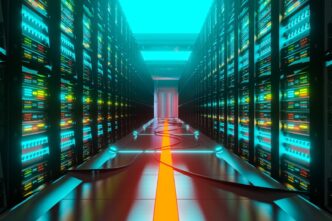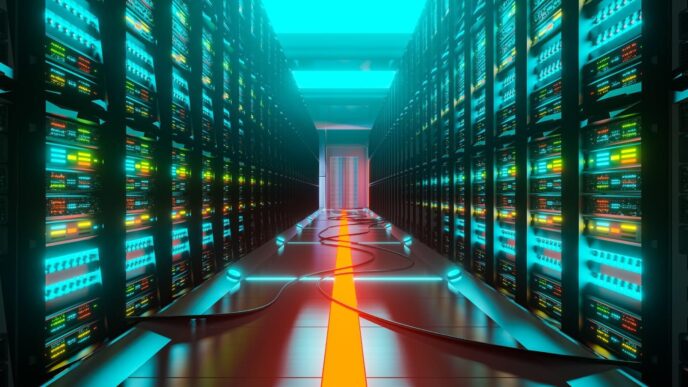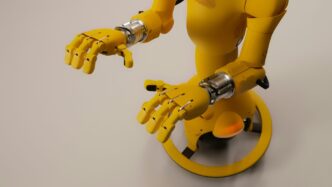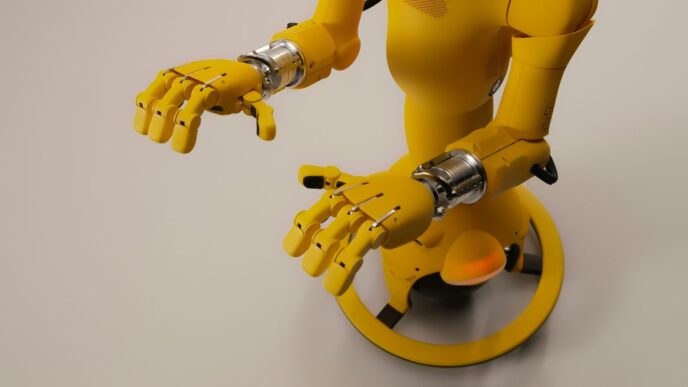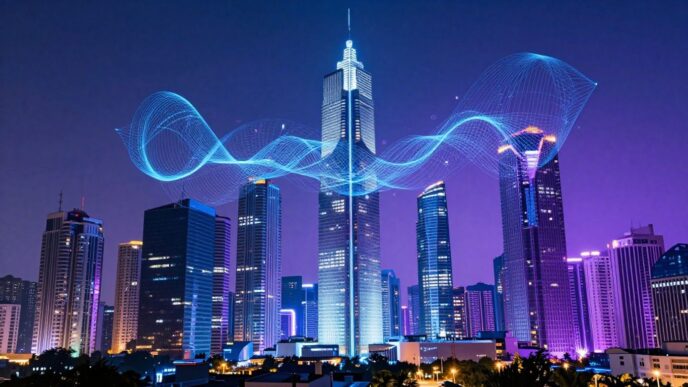The world of artificial intelligence is moving fast, and keeping up can feel like a full-time job. From new ways AI is being used in business and government to how it’s changing the way we work and learn, there’s always something new to report. We’ve gathered some of the latest techcrunch ai news to give you a snapshot of what’s happening.
Key Takeaways
- AI is showing up in unexpected places, like being hidden in downscaled images to trick systems, and also being used to make global operations centers run smoother.
- Countries and even individual U.S. states are actively developing their own approaches to AI, with the U.S. Army creating new job paths focused on AI.
- New AI applications are speeding up scientific discovery, like finding battery materials faster, and improving healthcare, such as detecting deepfakes and helping with lung cancer treatment.
- Businesses are investing in AI skills for their employees, while also seeing how AI can change cybersecurity and even lead to robot deliveries.
- The impact of AI on jobs is a big topic, with leaders from major companies like Salesforce and Amazon predicting job cuts due to automation, and AI agents starting to handle sales tasks.
Navigating the Evolving AI Landscape
It feels like every day there’s something new happening with AI, doesn’t it? It’s a lot to keep up with, but staying informed is key if you want to get ahead. We’re seeing AI pop up in all sorts of places, from making our daily tasks a bit easier to changing how big industries operate.
One interesting area is how AI is being used to spot problems in images. Researchers are finding ways to use AI to detect issues even in pictures that have been made smaller or less detailed. This could be a big deal for security and quality control. On a larger scale, AI is also helping global operations centers work more smoothly. Think about managing complex logistics or monitoring large-scale systems; AI can process vast amounts of data much faster than people can, helping to make better decisions.
We’re also seeing new AI facilities being built, and these are actually giving local economies a boost. It’s not just about the tech itself, but the jobs and investment that come with it. It’s pretty neat to see how these advancements are starting to have a real-world impact.
Here are a few key points to consider:
- AI Attack Vectors Emerge in Downscaled Images: New research shows AI can be used to find vulnerabilities in compressed image files, a potential security concern.
- AI Enhances Global Operations Centers: AI tools are improving efficiency and decision-making in managing complex, worldwide operations.
- New AI Facilities Drive Regional Economic Growth: The development of AI infrastructure is creating jobs and stimulating local economies.
It’s a fast-moving field, and these developments are just the tip of the iceberg. For instance, the way AI is being applied in areas like space exploration, much like Virgin Galactic’s new spaceship, shows just how broad its reach is becoming. Keeping an eye on these trends will be important as AI continues to shape our world.
AI’s Impact on Geopolitics and National Strategy
It’s becoming pretty clear that artificial intelligence isn’t just about cool new gadgets or faster computers anymore. It’s deeply tied into how countries operate on the world stage and plan for the future. We’re seeing this play out in a few key areas.
First off, there’s the ongoing discussion about who’s leading the pack. OpenAI’s CEO, Sam Altman, has pointed out that the U.S. might be underestimating China’s progress in AI. He mentioned that just controlling chip exports isn’t enough to keep pace, suggesting the competition is much broader and more complex. This isn’t just about technology; it’s a geopolitical race.
On the home front, different states are starting to make their own moves. For instance, Utah is getting involved with a new national AI task force, aiming to get federal policies in sync across different areas like education and defense. The goal seems to be finding a balance between pushing new tech forward and making sure it’s used responsibly. It’s interesting to see how these state-level initiatives might shape broader national strategies.
Even the military is getting in on the AI action. The Army, for example, is creating specific career paths for AI specialists. This shows a real commitment to building up internal expertise and integrating AI into defense operations more deeply. It’s a sign that AI is seen as a critical component for national security moving forward.
Here’s a quick look at some of the developments:
- China’s AI Push: Despite facing restrictions on advanced chips, China is pushing ahead with AI development. They’re finding ways to work around limitations, focusing on self-sufficiency. This suggests their AI capabilities might grow faster than some expect.
- U.S. State Legislation: States are beginning to draft their own AI laws, trying to keep up with the rapid changes. This patchwork of regulations could eventually lead to a more unified federal approach.
- Military AI Careers: The U.S. Army is establishing dedicated roles for AI professionals, recognizing the need for specialized talent within its ranks.
It’s a lot to keep track of, but it’s clear that AI is reshaping international relations and national planning. Keeping up with these shifts is important, especially as new communication tools like the iPager become available, potentially changing how information is shared globally.
Innovations in AI for Health and Sustainability

It’s pretty wild how fast AI is popping up in places we might not expect, especially when it comes to keeping us healthy and looking after the planet. We’re seeing some really interesting work happening.
AI Accelerates Battery Material Discovery
Finding new materials for things like batteries is usually a slow process, involving a lot of trial and error in labs. But AI is changing that. By crunching massive amounts of data on chemical compounds and their properties, AI can predict which materials are most likely to work well for specific applications, like storing more energy or charging faster. This speeds things up considerably, meaning we could see better battery tech hitting the market much sooner. Think about electric cars with longer ranges or phones that last for days – AI is helping make that a reality.
AI Detects Deepfake Videos with High Accuracy
Deepfake videos, where someone’s face or voice is digitally manipulated to make them appear to say or do things they never did, are becoming a real problem. They can be used to spread misinformation or even commit fraud. Thankfully, AI is also being used to fight back. New AI systems are being developed that can spot the subtle digital tells that deepfakes often leave behind. These tools analyze video frames, looking for inconsistencies in lighting, facial movements, or audio patterns that a human eye might miss. The goal is to create reliable ways to verify if video content is genuine before it causes harm.
AI Improves Lung Cancer Treatment Outcomes
When it comes to serious diseases like lung cancer, early detection and the right treatment plan make a huge difference. AI is stepping in here too. Hospitals are starting to use AI systems that can analyze medical images, like CT scans, alongside a patient’s medical history and genetic information. This helps doctors identify potential signs of cancer much earlier than before. It can also help predict how a patient might respond to different treatments, allowing for more personalized care. The idea is to catch the disease sooner and tailor treatments for better results, which could save a lot of lives.
Workforce Transformation Through AI
It feels like everywhere you look these days, AI is changing how we work. Companies are really starting to lean into it, not just for the flashy stuff, but for practical, everyday tasks. We’re seeing a big push to get employees up to speed with these new tools.
For instance, retailers are setting up their own training programs, kind of like academies, to teach their staff about AI. This isn’t just about learning a new software; it’s about understanding how AI can change their jobs, from customer service to inventory management. It’s a pretty big shift, and honestly, it makes sense. If the tools are changing, the people using them need to change too.
And it’s not just retail. Cybersecurity is another area where AI is making waves. Instead of just reacting to threats, AI is now being used to predict and prevent them. Think of it like having a super-smart assistant that’s constantly watching for anything suspicious. This means the people working in cybersecurity need to learn how to work with the AI, not just manage it.
We’re also seeing AI pop up in more unexpected places, like delivery services. Some companies are using AI to power their robot delivery fleets. This could change how logistics work, especially in urban areas. It’s a whole new way of thinking about getting goods from point A to point B, and it’s all thanks to AI making these robots smarter and more efficient.
Here’s a quick look at some of the trends:
- Retailers Launch AI Skills Academies: Companies are investing in training to equip their workforce for an AI-driven future.
- AI Reshapes Cybersecurity Defenses: The focus is shifting from reactive measures to proactive threat prediction and prevention.
- Robot Delivery Services Powered by AI: Automation is extending into logistics, changing how goods are transported.
AI in Education and Ethical Considerations
It feels like everywhere you look these days, AI is popping up in schools. States are teaming up with companies like Nvidia to get students familiar with this tech. It’s all about getting kids ready for jobs that might not even exist yet, which is kind of wild to think about. But, you know, it’s not all smooth sailing. There are some big questions being asked, even by folks like the Pope, about how AI might affect young people. He’s worried about the impact on their development and how they learn.
States Partner with Nvidia for AI Education
Several states are making moves to bring AI education into K-12 classrooms. They’re working with tech giants like Nvidia, which is a pretty big deal. The idea is to build up national AI literacy and make sure students are prepared for the future workforce. It’s a push to keep the U.S. ahead in technology.
Papal Concerns Regarding AI’s Impact on Youth
Even the Vatican is weighing in on AI in education. Pope Francis has voiced concerns about how artificial intelligence could shape the minds of the younger generation. It’s a reminder that as we bring these powerful tools into schools, we need to think carefully about the ethical side of things. We have to consider how AI might change how kids learn and interact.
BBC Takes Legal Action Over AI Content Misuse
On a different note, the BBC is taking legal action because their content is being used without permission to train AI models. This highlights a growing issue: who owns AI-generated content, and how do we prevent unauthorized use of existing material? It’s a complex problem that touches on copyright and the very nature of creativity in the age of AI. This situation really brings up the need for clear rules around AI and intellectual property. It’s a tricky area, and figuring it out is going to be important for everyone involved in creating and using content.
The Future of Work and AI-Driven Automation
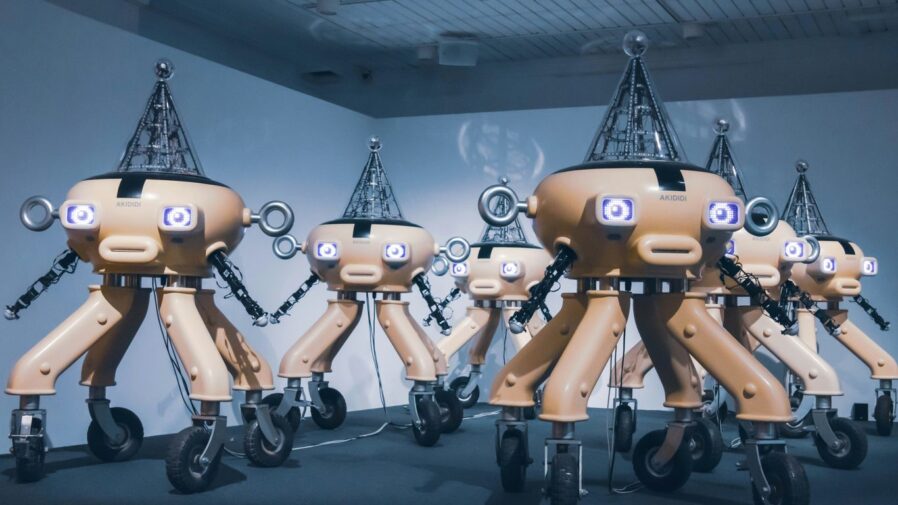
It’s becoming pretty clear that AI is going to change how we work, and not just in the tech world. We’re seeing big companies talk about it openly now.
Salesforce CEO Cites AI for Job Reductions
Salesforce’s CEO recently mentioned that AI is a big reason why they’re cutting jobs. It sounds like some tasks that people used to do are now being handled by AI systems. This isn’t just about replacing people entirely, but also about changing the nature of jobs. People might need to work alongside AI, or focus on different kinds of tasks that AI can’t do yet. It’s a bit of a wake-up call for everyone in the workforce.
Amazon CEO Predicts AI-Driven Job Cuts
Similarly, Amazon’s CEO has also spoken about AI leading to job cuts, especially in corporate roles. He pointed out that while some jobs might disappear, others will need workers to learn new skills. This suggests a big push for reskilling and upskilling is coming. Companies are looking at how AI can make things more efficient, and that often means rethinking their staffing needs. It’s a trend that seems to be picking up speed across many industries.
AI Agents Automate Sales Workflows
On the innovation front, we’re seeing AI agents designed to take over specific tasks, like those in sales. These agents can handle things like reaching out to potential customers, sending follow-up emails, and managing customer relationship management (CRM) data. The idea is to free up human sales reps to focus on more complex interactions and closing deals. It’s like having a digital assistant that works around the clock. This kind of automation could really change how sales teams operate and what skills are most important for success in the field.
Advancements in AI Infrastructure and Applications
It feels like every week there’s some new AI tool or system popping up, and honestly, it’s getting hard to keep track. But some of these developments are pretty significant for how we build and use technology.
Microsoft is rolling out a new vision for its Copilot, which apparently can scan your desktop to figure out what tasks you need help with. It sounds a bit like something out of a sci-fi movie, but the idea is to make AI more proactive in assisting with daily work. Then there’s Mira Murati’s company, Thinking Machines, which just landed some major funding. They’re apparently working on some pretty advanced AI systems, and getting that kind of investment suggests people believe in their vision for the future of AI.
Meanwhile, China is still pushing ahead with its AI development, even with some of the global constraints they’re facing. It’s a reminder that this technology isn’t just a Western thing; it’s a global race. We’re seeing new AI chips that are supposed to make data centers run faster, which is pretty important if you think about how much computing power all these AI models need. Broadcom, for instance, is shipping new chips designed to speed up connections between GPUs in data centers. This kind of hardware upgrade is what allows for training bigger and better AI models.
Here’s a quick look at some of the key areas:
- AI Chip Advancements: Companies like Broadcom are releasing new hardware to improve data center connectivity, which is vital for training large AI models.
- Proactive AI Assistants: Microsoft’s Copilot is aiming to understand user needs by scanning desktops, making AI more integrated into daily tasks.
- Global AI Development: China continues its significant investment and progress in AI, despite international challenges.
- AI Infrastructure Expansion: Groq, an AI chipmaker, has opened its first European data center to meet the growing demand for fast AI inference.
It’s a lot to take in, but these infrastructure and application updates are really the backbone of where AI is headed. Staying informed about these breakthroughs is key to understanding the broader AI landscape.
AI’s Role in Enterprise and Financial Services
It seems like everywhere you look these days, AI is popping up in businesses, especially in finance. Companies are really starting to see how this tech can change how they do things, from the back office to how they talk to customers. It’s not just about making things faster, though that’s a big part of it. It’s also about getting smarter with data and making better choices.
Banks, for instance, are jumping on board. Lloyds Bank recently rolled out an AI assistant called Athena. It’s designed to help out their customer service folks and also handle some internal tasks, like summarizing reports and making sure everything follows the rules. This kind of tool is supposed to make things quicker and more accurate, which is a big deal when you’re dealing with a lot of financial information. It’s not just Lloyds, either; lots of banks are figuring out how to weave AI into their daily operations. You can see this trend reflected in how companies like Experian are updating their credit risk models with AI. They’ve launched a new tool to help financial places check and validate these models more easily. This is pretty important because the economy is always shifting, and having up-to-date risk assessments is key. It’s all about modernizing how credit is evaluated.
Beyond the banks, other businesses are finding their own uses. Alibaba’s cloud business, which uses a lot of AI, has been doing really well, so much so that their stock went up quite a bit. This shows that investors are paying attention to how AI can drive growth. Then there’s the whole area of automation. Companies like Outreach are now using AI agents that can handle sales tasks on their own, like reaching out to potential customers and sending follow-up emails. It’s like having an autopilot for sales, which could really change how sales teams work. We’re also seeing AI pop up in less obvious places, like helping to manage federal budgets, making complex documents easier to understand. It’s clear that AI is becoming a tool for efficiency across many different sectors.
Here’s a quick look at some of the ways AI is being used:
- Customer Service: AI assistants can handle common queries, freeing up human agents for more complex issues.
- Risk Management: AI tools help financial institutions assess and manage credit risk more effectively.
- Operations: Automating tasks like report summarization and data analysis improves efficiency.
- Sales: AI agents can manage prospecting and follow-up, boosting sales team productivity.
Of course, with all this new tech, there are always questions about how it’s regulated. Insurers, for example, are using AI a lot for things like underwriting and checking for fraud, but the rules around it are still being figured out. People are worried about things like bias in the AI’s decisions and making sure the processes are clear. It’s a balancing act between using the tech to get ahead and making sure it’s used responsibly. The whole fintech space, which is basically finance meeting technology, is seeing a lot of this change, with companies like Apple and Samsung getting into payments. It’s a fast-moving area, and staying informed is important for anyone in the business world. You can find more on how fintech is changing things.
Wrapping Up the AI Buzz
So, that’s a quick look at what’s been happening in the AI world lately. From new ways AI is being used in everyday things like food delivery and retail to big government investments and even warnings from world leaders, it’s clear AI isn’t slowing down. We’re seeing it change how businesses operate, how we learn, and even how we think about security and jobs. It’s a lot to keep up with, but staying informed helps us understand where things are headed. Keep an eye out for more updates as this technology continues to shape our future.
Frequently Asked Questions
How is AI being used to make batteries better?
Scientists are using AI to find new materials that can make batteries last longer, charge faster, and be more eco-friendly. AI speeds up this search a lot, taking years of work down to just weeks. This is a big step for energy technology.
What’s new with AI and cybersecurity?
AI is making cyberattacks smarter and harder to stop because the bad guys’ computer programs can change their tricks on the fly. But, AI is also being used to build better defenses that can predict and block these attacks. It’s like a constant battle between AI for attacking and AI for defending.
How is AI changing jobs?
Some companies are using AI to do tasks that people used to do, which can lead to fewer jobs in certain areas. For example, AI can handle customer service or automate sales tasks. This means workers might need to learn new skills to keep up.
Are governments using AI for national security?
Yes, countries are looking at how AI can help with national strategy. For instance, the U.S. Army is creating new jobs specifically for people who work with AI. At the same time, there’s concern about countries like China making big AI advancements, and how that affects global power.
How is AI helping in healthcare?
AI is making big improvements in health, like helping doctors find lung cancer earlier and plan better treatments. It’s also being used to discover new materials for things like batteries and to help detect fake videos more accurately, which helps stop the spread of false information.
Is AI being used in schools?
Many places are starting to teach students about AI. For example, Mississippi is working with a company called Nvidia to bring AI lessons to middle and high schools. This is to help prepare young people for future jobs in technology.





